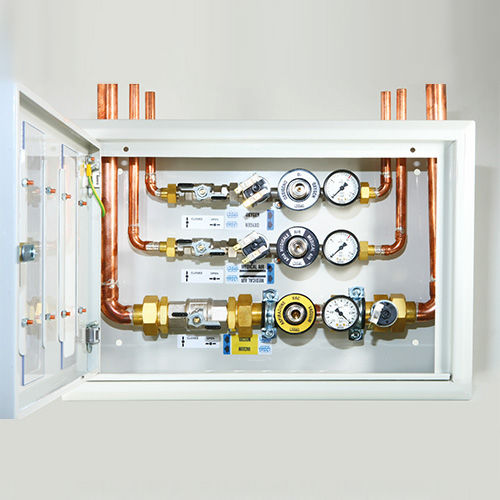
- Laboratory
- Laboratory infrastructure
- Pressure control unit
- STM - Sistemi Tecnologie Medicali
Pressure control unit QAGVfor medical gas plantsfor vacuum production systems
Add to favorites
Compare this product
fo_shop_gate_exact_title
Characteristics
- Type
- pressure
- Applications
- for medical gas plants, for vacuum production systems
Description
The QAG – QAGV area shut-off panel boards are conceived and realized according to the Directive 93/42/EEC and related norm ISO 7396 -1.
Their function is to allow, thanks to the built-in ball valves, the exclusion or the passage of the medical gases in a service or area and to defi ne this area from the rest of the network. Downstream each valve for compressed gas it is installed one pressure switch and a specifi c gas coded emergency terminal unit. For Vacuum network it is installed a vacuum switch and one emergency terminal unit.
For each component subject to maintenance / replacement it is provided an anti-return Device in order to allow a quick intervention with a non-stop service. The various types of panel boards are defi ned by the number of the gas, the presence of the vacuum unit, the presence of the pressure gauge and by the type of panel board mounting of fl ush or surface ( QAG without vacuum, QAGV with vacuum ).
AREA SHUT – OFF VALVES QAG – QAGV
White lacquered steel surface/flush mounting box with :
- 1 to 6 MEDICAL GAS GROUPS constituted by :
1 x 1/2 “ gas ball valves diam. 14-1
1 x block with gauge range 0 -10 bar
1 x emergency supplying unit according with AFNOR **
1 x reservation for pre-calibrated pressure control
device for H.P. and L.P. operating at 4 bar, ± 20%*
- 1 VACUUM GROUP constituted by :
1 x 3/4 “ vacuum ball valve diam.22-1
1 x block with vacuum gauge scale preset for low Vacuum level
(lower than – 440 mbar).
1 x reservation vacuum gauge range 0 / – 1 bar
* On request pressure transducer
** Option UNI 9507 or NIST
Catalogs
Other STM - Sistemi Tecnologie Medicali products
Device for distribution system
Related Searches
*Prices are pre-tax. They exclude delivery charges and customs duties and do not include additional charges for installation or activation options. Prices are indicative only and may vary by country, with changes to the cost of raw materials and exchange rates.




















